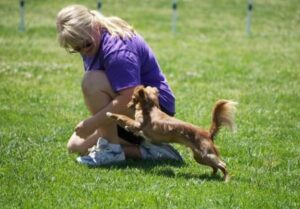 After 22 years, I am told I am now a pack leader (great dog trainer) in the industry. Wags & Wiggles has been lucky to meet and help many fledgling dog trainers.
After 22 years, I am told I am now a pack leader (great dog trainer) in the industry. Wags & Wiggles has been lucky to meet and help many fledgling dog trainers.
There has been a recent trend of people wanting the fast track to professional dog trainer. I try to be politically correct but I want to laugh out loud and suggest they try to fast track their way to doctor, lawyer, or electrician.
Dedication to Learning the Trade
Just because we are working with dogs, it doesn’t mean trainers require any less schooling, hands on experience, or doing the work to learn their trade.
No Fast Track to Success
Perhaps it’s the culture of getting everything now and fast, never mind good old fashioned elbow grease to make your way in the world. I have heard that they can’t be bothered to sacrifice anything (time, money, driving time) to learn to be a great dog trainer.
Large Chain Pet Stores aren’t helping by giving their new staff a 2-week crash course and then labeling them “trainers”. Perhaps I am just cynical – when I first learned the trade, there were no convenient facilities like Wags & Wiggles. I had to hand pick my mentors, beg them to train me, and travel across the country for weeks at a time to learn from the best.
Learning dog training isn’t just about teaching sit and stay. Either extreme, yanking a dog around on a choke chain or luring them everywhere with food doesn’t make a dog trainer. Depending on prior experience with dogs, it can take 2-3 years before someone is merely proficient at training.
At a recent trainers forum, we developed a list of the qualities of a great dog trainer. If you have some of these traits, then you are already ahead of the game. Now you just need to dig deep and decide if you are ready to do the work to become something great.
Qualities of a Great Dog Trainer
- Embraces the philosophy that training is something you do with your dog, not to your dog.
- Accepts that training can be measured for effectiveness.
- Has done their research to pick a training philosophy and will hold to ethical standards.
- Strong Problem Solving Skills.
- Knows how to write out a training plan.
- Can read dog (and human) body language and subtleties that vary between individuals.
- Understands behavior change models including reinforcement and punishment.
- Can you identify trends? Particularly behavior trends.
- Good Observation Skills. Allows adjustment to the reaction of the learner.
- Active Listener. Focusing on what others tell you, not your response.
- Flexible thinker. Many roads to success.
- Strong preparation skills. Being prepared to train a dog is vital.
- Good time management. Spending long periods of time training can be detrimental to the dog.
- Be Humble. Dogs don’t care what you have achieved.
- Be Innovative. Change your reward based on what the dog considers a reward.
- Seeker. Be willing to sacrifice to learn.
- Patient – with yourself, other humans and of course the dogs.
- Desire to practice their training skills over and over until perfect.
- Resilient. Able to get past training bumps.
- Dedication to being a lifelong student. Learn to teach, teach to learn.
- Self Motivated. Often times its just you and the dog with no one to tell you how to proceed.
- Accepting of mistakes. Dogs make mistakes just like humans.
- Ability to Change Yourself. Changing your attitude to match what the dog needs.
- Empathy and Vulnerability. All of us were once new at this.
- Know when to refer to someone who is better suited than you to help.
- Ability to break down a process and explain it start to finish. Many behaviors we teach dogs have several steps that can’t be taught in a lump sum.
- Understands that behavior is not held in a vacuum and is not driven by emotions like revenge, anger, or being stubborn. There are antecedents and consequences that affect and continue behavior.
- Understand thresholds to aggressive behavior.
- Desire to learn training jargon to have a common language with other trainers.
- Never lose sight of the fun of training dogs!

Last week, I visited my sister’s house, and when I arrived, her dog attacked and almost bit me. My sister’s worried about his behavior towards other dogs and people, so she wants to find a trainer to help her, and I think your guide will make that process easier. I appreciate your advice on finding a dog trainer that has strong preparation to deliver training sessions. [Link deleted]